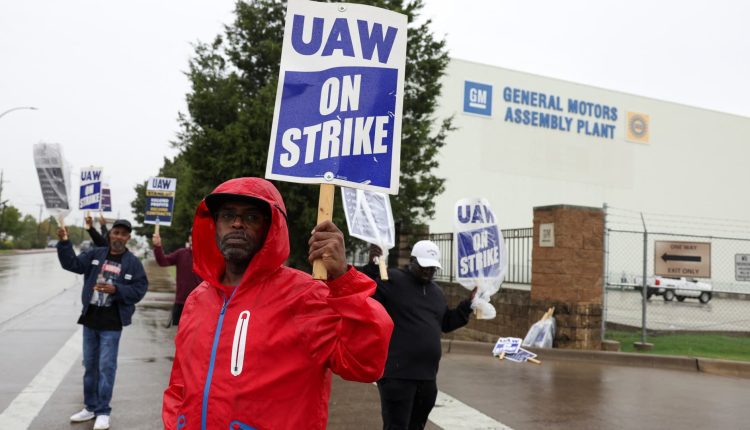United Auto Workers members rally outside Stellantis’ Ram 1500 plant in Sterling Heights, Mich. after the union called a strike at the plant on Oct. 23, 2023.
Michael Wayland / CNBC
DETROIT — Negotiators with the United Auto Workers union and Stellantis have in principle agreed to the terms of a tentative deal following roughly six weeks of targeted U.S. labor strikes by the union, according to sources briefed on the talks.
The terms of the deal must still be approved by UAW leadership before the union plans to officially brief local union leaders and then publicly announce the tentative agreement on Saturday, according to three sources who agreed to speak on the condition of anonymity because the talks are private.
The tentative agreement, which would still need to be approved by union leaders and ratified by members, is patterned off a 4½-year agreement reached between the union and Ford Motor on Wednesday, sources previously told CNBC.
UAW President Shawn Fain was with Stellantis in intense talks Thursday and Friday before turning his attention to General Motors. UAW and GM are expected to resume talks midday Saturday in hopes of also reaching a deal, according to a source familiar with the talks.
The UAW plans to hold a meeting early Saturday afternoon with local Stellantis union leaders following the sides agreeing in principle to the terms of a deal.
Bloomberg News first reported Saturday the company made additional concessions to the UAW and the union aims to announce a tentative agreement this afternoon that includes a new product for an idled assembly plant in Illinois.
The deal comes after the union reached an agreement on Wednesday with Ford. That agreement still needs to be approved by union leaders and ratified by members.
The tentative agreement is expected to end six weeks of targeted labor strikes by the union after the sides failed to reach new deals for 146,000 UAW members before a Sept. 14 deadline. The union called back more than 16,000 striking Ford workers after reaching a tentative deal with the automaker.
Ford’s deal included 25% pay increases over the term of the agreement, including an initial increase of 11%. The raises and benefits cumulatively raise the top wage to more than $40 an hour, including an increase of 68% for starting wages to over $28 an hour.
It also reinstated cost-of-living adjustments, reduced an eight-year path to top wages to three years and allowed the right to strike over plant closures, among other significantly enhanced benefits.
The strikes have collectively cost GM, Ford and Stellantis billions of dollars in lost production. Ford said Thursday that the union’s strike has cost it $1.3 billion and the deal, if ratified by members, would increase labor costs by roughly $850 to $900 per vehicle produced.
GM said Tuesday the strike had cost it about $800 million.
The proposed agreements are record-setting for the union, which was far more confrontational and strategic during the talks than in recent history.
The union initiated negotiations with all three automakers at once, breaking from recent history when UAW leaders would bargain with each automaker individually, select a lead company to focus efforts on and then pattern the remaining deals off a leading tentative agreement.
It’s not immediately clear how much the labor deals will increase labor costs for the companies, which had argued that giving in to all of the union’s demands would affect their competitiveness and even long-term viability.
Deutsche Bank recently estimated the overall cost increase of the agreement at Ford to be $6.2 billion over the term of the agreement; $7.2 billion at GM; and $6.4 billion at Stellantis.
Read the full article here

